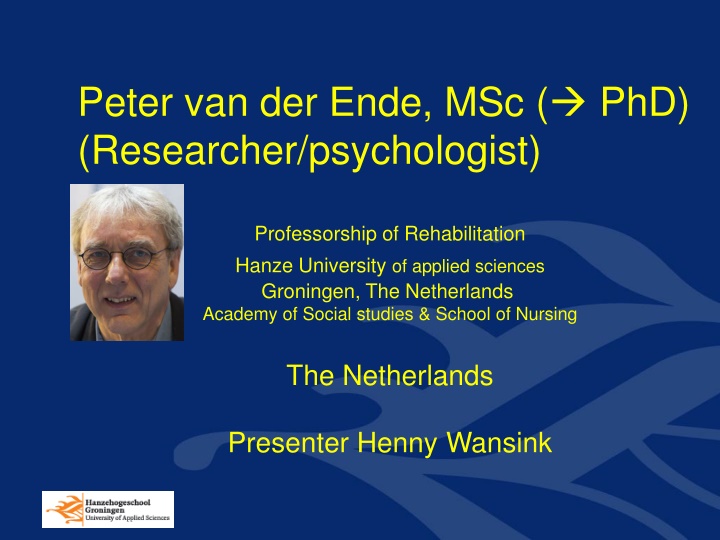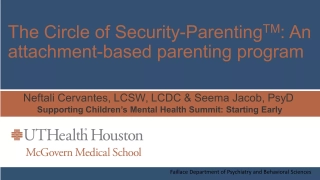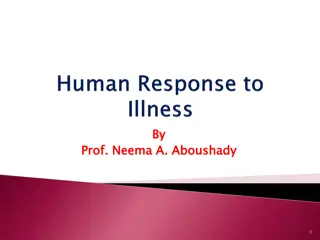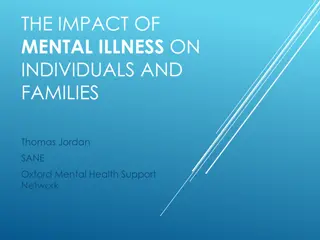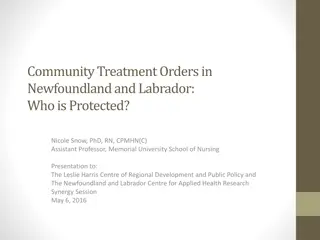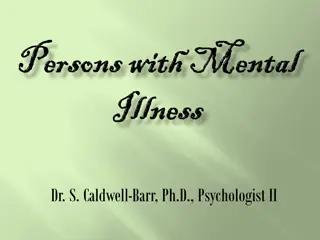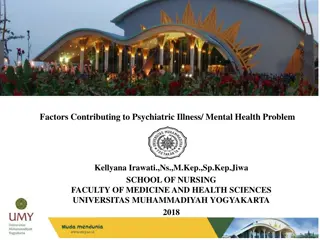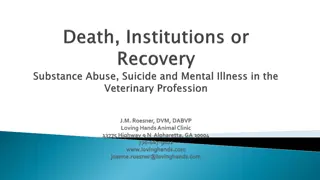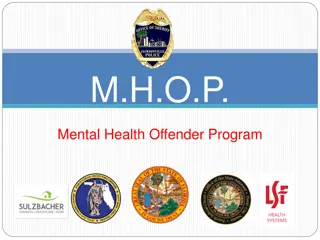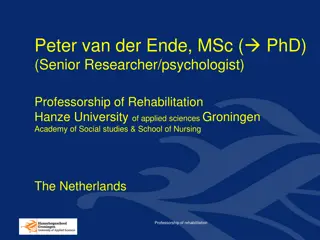Strategies for Success in Parenting with Mental Illness: Insights from Researcher and Psychologist Peter van der Ende
Peter van der Ende, MSc., PhD, researcher and psychologist, presents valuable insights on fulfilling the parental role for individuals with mental illness. His work focuses on personal recovery, rehabilitation, and strategies for achieving success and satisfaction in parenting. The content covers motivation, needs, barriers, and strategies to empower parents facing mental health challenges.
Download Presentation

Please find below an Image/Link to download the presentation.
The content on the website is provided AS IS for your information and personal use only. It may not be sold, licensed, or shared on other websites without obtaining consent from the author.If you encounter any issues during the download, it is possible that the publisher has removed the file from their server.
You are allowed to download the files provided on this website for personal or commercial use, subject to the condition that they are used lawfully. All files are the property of their respective owners.
The content on the website is provided AS IS for your information and personal use only. It may not be sold, licensed, or shared on other websites without obtaining consent from the author.
E N D
Presentation Transcript
Peter van der Ende, MSc ( PhD) (Researcher/psychologist) Professorship of Rehabilitation Hanze University of applied sciences Groningen, The Netherlands Academy of Social studies & School of Nursing The Netherlands Presenter Henny Wansink
PhD Thesis: Vulnerable parenting A personal recovery and psychiatric rehabilitation point of view (Farkas & Anthony, 1991); Supported parenting A transdiagnostic approach From client s need to a valued role
Model to clarify personal recovery and rehabilitation strategies of people with mental illness to fulfill a parental role with success and satisfaction.
Fulfilling the parental role by people with mental illness Motivation Children as a positive stimulus## Structuring parents lives Recovery with parental role Needs of parents Getting daily energy## Addressing More work opportunities and income1 Improvement of health problems2 Increasing parental competencies Handling the mourning process; losing custody3 Support in childcare and housekeeping Coping with the illness and medication Information about illness and support Crisis intervention for children Goals Fulfilling the parental role with success and satisfaction ## Self-actualization Maintaining a good balance between attention for own life and parenting lust for life trust services vulnerability confusion in people and Barriers and threats that parents face Discrimination4 Loss of custody5 Worries about transfer to children6 Neglect of the child## Confusion in behavior Feeling lack of competencies Strategies Develop confidence in one s own competencies7 Finding words to communicate about parents problems7 Making plans for parenting activities## Finding shared activities with children Positive valued identity7 Meaning and structure7 Growth exchange of positive emotions Empowerment Requesting support
Motivation Goals success and satisfaction in parenting Barriers and threats that parents face Needs of parents Strategies
Needs of parents Getting daily energy lust for life trust in people and services Addressing vulnerability confusion More work opportunities and income Improvement of health problems Increasing parental competencies Handling the mourning process; losing custody Support in childcare and housekeeping Coping with the illness and medication Information about illness and support Crisis intervention for children
Barriers and threats that parents face Discrimination Loss of custody Worries about transfer to children Neglect of the child Confusion in behavior Feeling lack of competencies
Motivation Children as a positive stimulus Structuring parents lives Recovery with parental role Strategies Develop confidence in one s own competencies Finding words to communicate about parents problems Making plans for parenting activities Finding shared activities with children Positive valued identity Meaning and structure Growth exchange of positive emotions Empowerment Requesting support
Goals Fulfilling the parental role with success and satisfaction Self-actualization Maintaining a good balance between attention for own life and parenting
Fulfilling the parental role by people with mental illness Motivation Children as a positive stimulus## Structuring parents lives Recovery with parental role Needs of parents Getting daily energy## Addressing More work opportunities and income1 Improvement of health problems2 Increasing parental competencies Handling the mourning process; losing custody3 Support in childcare and housekeeping Coping with the illness and medication Information about illness and support Crisis intervention for children Goals Fulfilling the parental role with success and satisfaction ## Self-actualization Maintaining a good balance between attention for own life and parenting lust for life trust services vulnerability confusion in people and Barriers and threats that parents face Discrimination4 Loss of custody5 Worries about transfer to children6 Neglect of the child## Confusion in behavior Feeling lack of competencies Strategies Develop confidence in one s own competencies7 Finding words to communicate about parents problems7 Making plans for parenting activities## Finding shared activities with children Positive valued identity7 Meaning and structure7 Growth exchange of positive emotions Empowerment Requesting support
Strategies in personal recovery process for parents with mental illness and tools for professionals
Email p.c.van.der.ende@pl.hanze.nl Website: www.ouderschap-psychiatrie.nl
References Carpenter-Song E. & Nicholson J. (2012). Parenting as a context for recovery for women with mental illness. Child and Youth Mental Health Matter Conference. Vancouver, BC, 6 8 May 2012. Coverdale, J.H., Aruffo, J.A. (1989). Family planning needs of female chronic psychiatric outpatients. The American journal of psychiatry, 146(11): 1489-1491. Haans, G., L. Robbroeckx, J. Hoogeduin en A. van Beem-Kloppers (2004). Ouderbegeleiding bij roldifferentiatie. Amsterdam: Uitgeverij SWP. Hosman, C.M., Van Doesum K.T., Van Santvoort F (2009). Prevention of emotional problems and psychiatric risks in children of parents with a mental illness in the Netherlands: I. The scientific basis to a comprehensive approach. Australian e- Journal of Advanced Mental Health 8(3), 250 263. doi:10.5172/jamh.8.3.250. Jeffery, D., Clement, S., Corker, E., Howard L.M., Murray, J. & Thornicroft. G. (2013). Discrimination in relation to parenthood reported by community psychiatric service users in the UK: a framework analysis. BMC Psychiatry 2013, 13:120 doi: 10.1186/1471-244X-13-120
References-continued Miller, L.J. (1996). Comprehensive prenatal and postpartum psychiatric care for women with severe mental illness. Psychiatric Services 47 (10):1108-1111 Mowbray, C. T., Oyserman, D., Bybee, D., MacFarlane, P., & Rueda-Riedle, A. (2001). Life circumstances of mothers with serious mental illness. Psychiatric Rehabilitation Journal, 25, 114 123. doi:10.1037/h0095034. Van der Ende, P.C. (2016). Vulnerable Parenting, a study on parents with mental health problems: strategies and support. Groningen: Hanze University of Applied Sciences Groningen. Van der Ende, P.C., Van Busschbach, J.T., Nicholson, J., Korevaar, E.L. & Van Weeghel, J. (2016). Strategies for parenting by mothers and fathers with a mental illness. Journal of Psychiatric and Mental Health Nursing 23, 86 97 doi: 10.1111/jpm.12283. Van der Ende P.C. , Van Busschbach J.T., Nicholson J., Korevaar, E.L. ,Van Weeghel, J. (2014). Parenting and psychiatric rehabilitation: Can parents with severe mental illness benefit from a new approach? Psychiatric Rehabilitation Journal, Vol 37(3), Sep 2014, 201-208 http://dx.doi.org/10.1037/prj0000067
